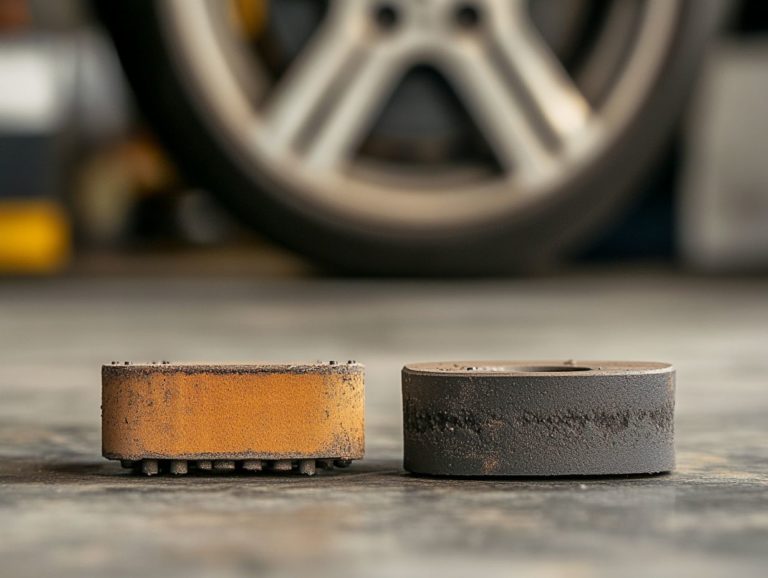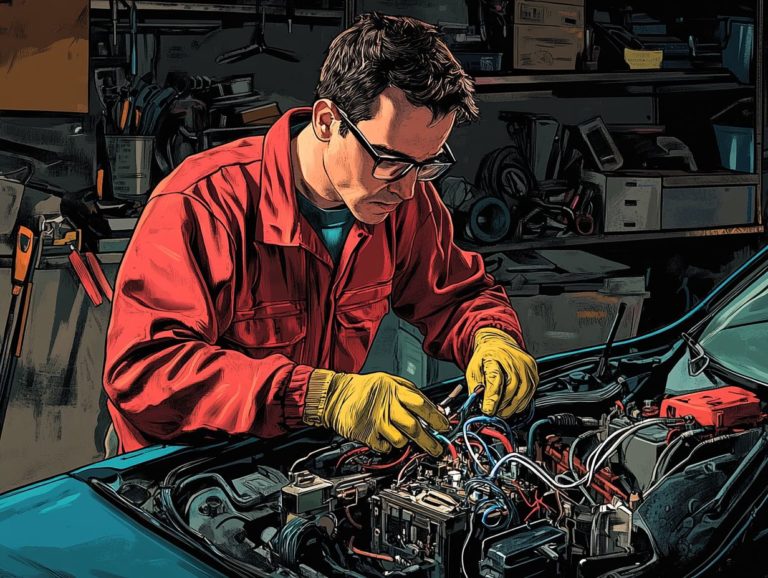How to Identify and Fix Exhaust Issues?
Exhaust issues can quietly creep up on any vehicle owner, resulting in diminished performance and elevated emissions.
Grasping the common types of exhaust problems is essential for preserving your car’s health. This article will guide you through the signs to look out for, the root causes of malfunctions, and the effective diagnostic tools at your disposal.
You’ll uncover practical DIY solutions and gain insights on when it s wise to seek professional assistance. Additionally, you’ll learn maintenance practices to avert future complications.
Ensure your ride operates at its best by mastering the art of identifying and addressing exhaust problems!
Contents
Key Takeaways:
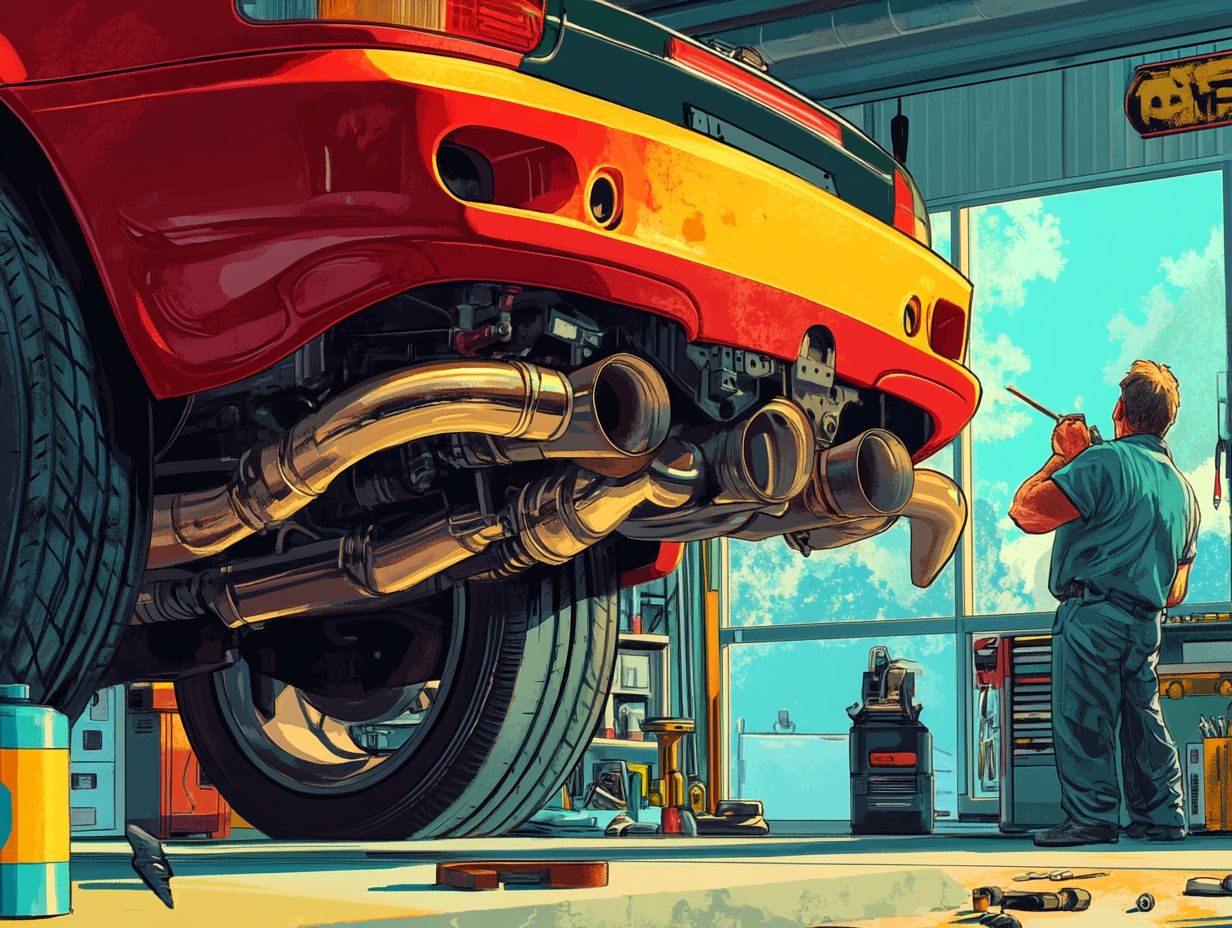
- Regularly inspect your exhaust system for rust, cracks, and leaks to prevent more serious issues down the road.
- Unusual noises, decreased engine performance, and strong odors are all signs of possible exhaust problems that should be addressed promptly.
- Proper diagnosis and repair of exhaust issues require specialized tools and techniques. Knowing when to seek professional help is crucial for the safety and longevity of your vehicle.
Common Exhaust Issues
Common exhaust issues can profoundly impact your vehicle s performance and fuel efficiency.
You may notice unsettling symptoms like strange odors, odd noises, or the unwelcome illumination of the check engine light.
Understanding common exhaust problems helps you maintain your vehicle. Key issues include exhaust leaks and muffler malfunctions.
The catalytic converter and oxygen sensor are crucial for ensuring optimal engine performance and emissions control.
By committing to regular inspections and addressing repairs promptly, you can avert more serious complications in the future.
Types of Exhaust Problems
Exhaust problems can manifest in various ways, often encompassing exhaust leaks, muffler complications, and rust issues.
When rust begins to take hold, especially in older vehicles, it can create holes in the exhaust pipes.
This allows harmful gases to escape into the atmosphere rather than being safely redirected. These leaks undermine your vehicle s performance and can present serious health risks for everyone inside the car.
Problems with the catalytic converter can greatly impact both engine efficiency and emissions levels.
A broken converter increases carbon emissions and diminishes fuel efficiency, putting additional strain on your vehicle’s performance and the environment.
Therefore, maintaining a healthy exhaust system is essential for ensuring an optimal driving experience.
Signs of Exhaust Issues
Spotting the signs of exhaust issues is crucial for keeping your vehicle healthy and safe on the road!
Pay attention to common symptoms such as unusual noises, peculiar smells, and vibrations. Each can signal underlying problems within the exhaust system that deserve your immediate attention.
Identifying Symptoms and Warning Signs
Identifying the symptoms and warning signs of exhaust issues is crucial for preventing further damage.
Pay close attention to the check engine light, unusual vibrations, odd noises, and strange smells they could all signal trouble.
A persistent check engine light might indicate exhaust leaks or sensor malfunctions. Ignoring this could compromise your car’s performance.
Similarly, if you feel unusual vibrations while idling or accelerating, it may indicate loose exhaust components or damaged hangers.
Strange noises, like hissing or popping, can point to problems with the exhaust manifold or a compromised catalytic converter.
If you catch a whiff of something sulfur-like or reminiscent of rotten eggs, that s a potential sign of catalytic converter failure or a fuel-rich mixture.
When these symptoms present themselves, it’s wise to seek a professional inspection. This way, you can ensure an accurate diagnosis and sidestep potentially costly repairs down the line.
Causes of Exhaust Issues
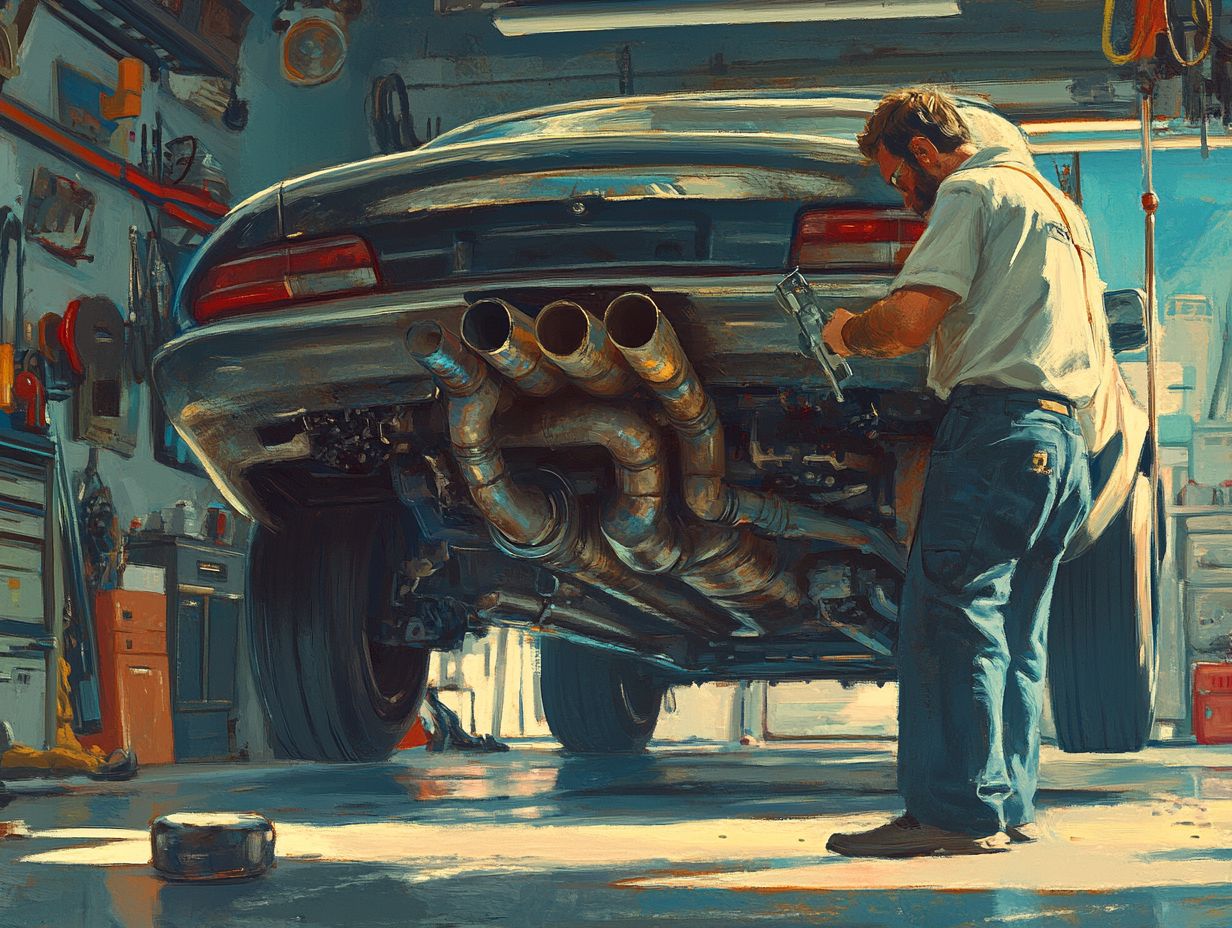
Understanding the causes of exhaust issues is crucial for maintaining your vehicle effectively. Common culprits include exhaust leaks, rust problems, and malfunctioning components like the catalytic converter and oxygen sensor.
Being aware of these factors helps you address potential problems early and ensures your vehicle operates at its best.
Possible Reasons for Malfunctions
Exhaust malfunctions often stem from environmental factors that can lead to rust issues, wear and tear on critical components, and failures in the oxygen sensor.
Neglecting routine vehicle maintenance can worsen these problems. Dirt and debris can accumulate in the exhaust system, hindering its efficiency.
This oversight contributes to increased emissions, negatively affecting environmental quality, and detracts from overall vehicle performance, resulting in reduced acceleration and higher fuel consumption.
If these issues go unaddressed, you risk costly repairs or even engine damage. You must prioritize exhaust system checks and routine maintenance to keep your vehicle running smoothly and efficiently.
Diagnosing Exhaust Issues
Diagnosing exhaust issues requires a systematic approach that utilizes specialized tools and techniques to evaluate critical components, such as the exhaust manifold, catalytic converter, and oxygen sensor.
Recognizing the value of a professional inspection, preferably by certified mechanics or mobile mechanics, ensures a thorough and accurate assessment.
Tools and Techniques for Diagnosis
- Smoke Machines: Introduce a safe, visible vapor into the exhaust system to uncover leaks.
- Pressure Testers: Detect any drop in pressure to identify potential blockages or damage.
- OBD-II Scanners: Connect to your vehicle’s onboard diagnostics system, delivering real-time data about engine performance and emissions.
These insights are crucial for professionals. They often use techniques like visual inspections, sound assessments, and temperature evaluations during thorough inspections. Mobile mechanics, equipped with these diagnostic tools, can perform detailed checks right at your vehicle’s location, making the process both convenient and efficient for you as a vehicle owner.
Fixing Exhaust Issues
Addressing exhaust issues can vary significantly, from straightforward DIY fixes to intricate repairs that need professional assistance.
By understanding the specifics of the problem whether muffler complications or exhaust leaks you can determine the most suitable approach for your vehicle.
DIY Solutions and When to Seek Professional Help
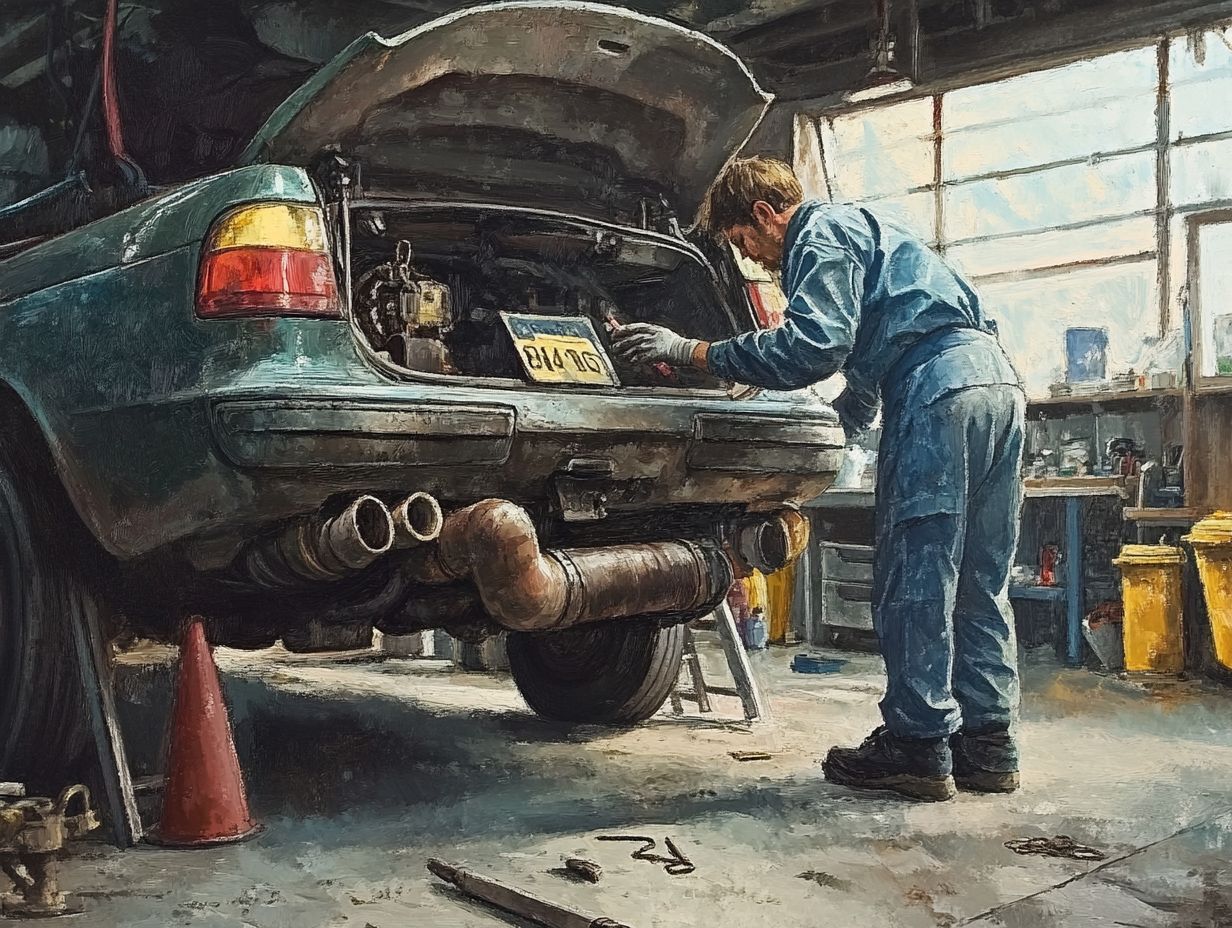
For minor exhaust issues, like small leaks or muffler troubles, DIY solutions can be quite effective. However, it s essential to know when to call in the professionals to ensure your vehicle remains safe and performs at its best.
Many car owners can tackle these minor challenges with a basic set of tools think wrench sets, jack stands, and exhaust sealing tape.
For example, assessing a small leak often involves a straightforward visual inspection for rust or holes. In many cases, a simple patch or clamp can fix it.
Yet, it s vital to recognize when the problem runs deeper, such as issues involving catalytic converters or intricate exhaust systems, where professional diagnostic equipment is necessary. Ignoring these complex issues can lead to diminished fuel efficiency and compromised engine performance, highlighting the importance of balancing DIY repairs with an awareness of your own limitations.
Check your exhaust system today to prevent costly repairs tomorrow!
Preventing Exhaust Issues
Preventing exhaust issues starts with your commitment to regular vehicle maintenance. By adopting best practices, you can significantly extend the lifespan of your exhaust system while enhancing fuel efficiency.
Taking these proactive steps ensures that your vehicle runs smoothly and efficiently. Enjoy the journey ahead!
Maintenance Tips and Best Practices
Adopting maintenance tips and best practices is crucial for keeping your exhaust system in good shape. This helps minimize rust issues and maintain optimal vehicle performance.
Regular checks are invaluable for spotting early signs of wear and tear. Inspect the system at least once every six months for visible corrosion or loose parts that could escalate into larger problems.
Apply a protective coating to shield your exhaust from moisture and road salt common causes of rust. When extensive repairs are necessary, trust ASE-certified professionals, who are skilled in examining and addressing every aspect of your exhaust system to extend its lifespan.
Watch this video for a detailed guide on exhaust maintenance.
Frequently Asked Questions
What are common signs of exhaust issues?
- Loud or unusual noises from the exhaust system
- Decreased fuel efficiency
- A noticeable decrease in engine performance
- Visible smoke from the tailpipe
How can I identify where the issue is coming from?
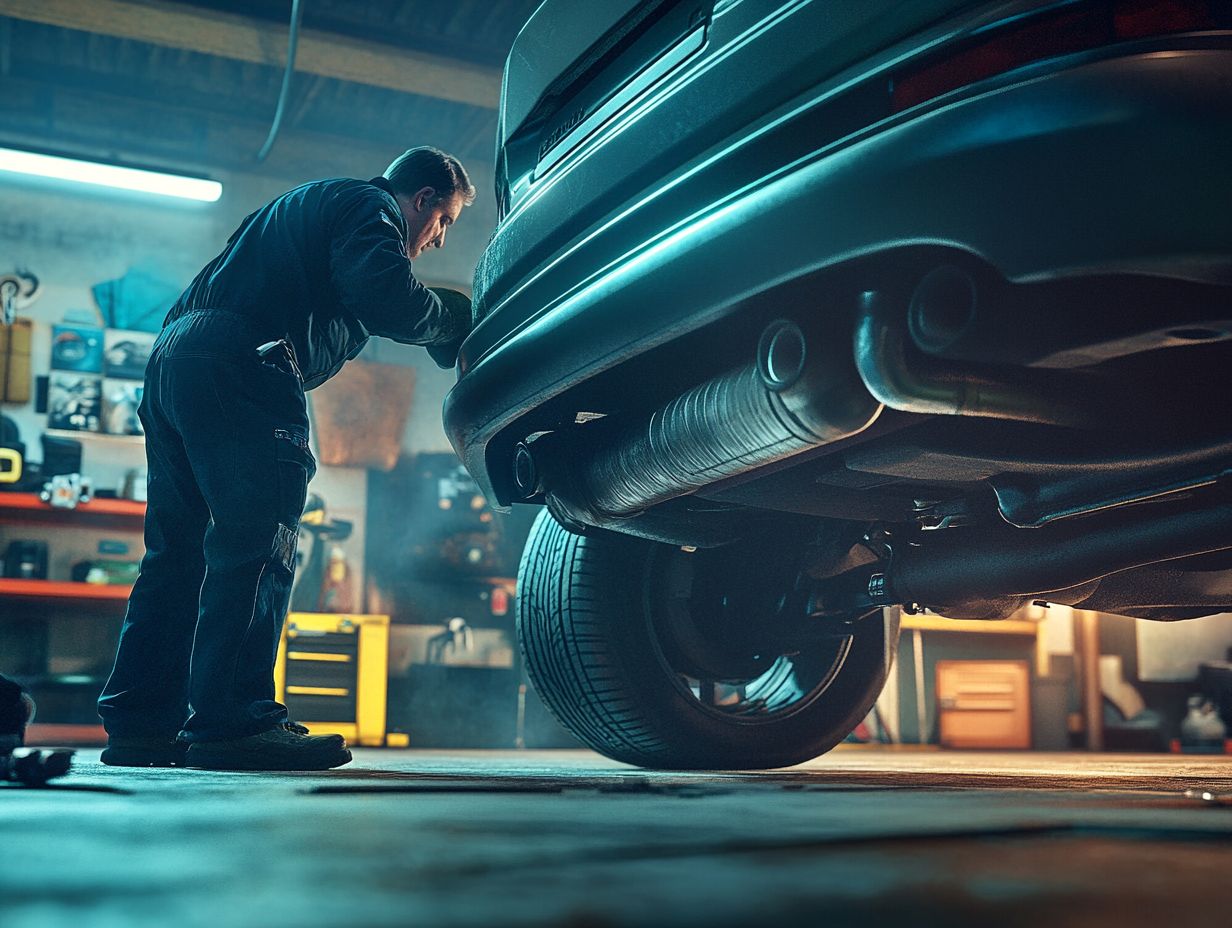
The first step in identifying an exhaust issue is to visually inspect the exhaust system. Look for any visible damage, such as holes or cracks, and check all connections to ensure they are secure. For more detailed guidance, learn how to know if your car needs a new exhaust. You can also listen for strange noises when the engine is running.
What should I do if I find a leak in the exhaust system?
If you find a leak in the exhaust system, get it fixed as soon as possible! A leak can allow harmful fumes into your vehicle’s cabin, leading to potential health risks. It can also impact engine performance and decrease fuel efficiency.
Can I fix an exhaust issue myself?
You can fix minor exhaust issues yourself, such as replacing a damaged muffler or repairing a small crack. However, for more complex issues, take your vehicle to a professional mechanic to ensure proper diagnosis and repair.
What are some common causes of exhaust issues?
Exhaust issues can be caused by various factors, including corrosion, wear and tear, and damage from road debris. Regular maintenance and inspections help catch potential issues before they become major problems.
How can I prevent exhaust issues from occurring?
To prevent exhaust issues, regularly maintain your vehicle and have the exhaust system inspected. This includes checking for visible damage, replacing worn components, and keeping your vehicle clean to prevent corrosion. Address any strange noises or decreased performance as soon as they arise!
Schedule a maintenance check today to keep your exhaust system in top shape!

